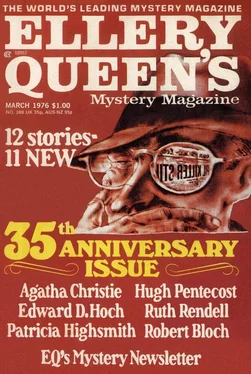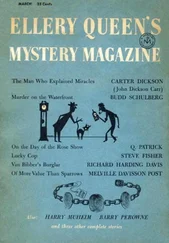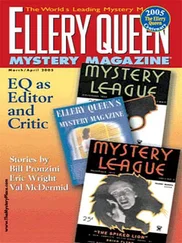Аврам Дэвидсон - Ellery Queen’s Mystery Magazine. Vol. 67, No. 3. Whole No. 388, March 1976
Здесь есть возможность читать онлайн «Аврам Дэвидсон - Ellery Queen’s Mystery Magazine. Vol. 67, No. 3. Whole No. 388, March 1976» весь текст электронной книги совершенно бесплатно (целиком полную версию без сокращений). В некоторых случаях можно слушать аудио, скачать через торрент в формате fb2 и присутствует краткое содержание. Город: New York, Год выпуска: 1976, Издательство: Davis Publications, Жанр: Детектив, на английском языке. Описание произведения, (предисловие) а так же отзывы посетителей доступны на портале библиотеки ЛибКат.
- Название:Ellery Queen’s Mystery Magazine. Vol. 67, No. 3. Whole No. 388, March 1976
- Автор:
- Издательство:Davis Publications
- Жанр:
- Год:1976
- Город:New York
- ISBN:нет данных
- Рейтинг книги:5 / 5. Голосов: 1
-
Избранное:Добавить в избранное
- Отзывы:
-
Ваша оценка:
- 100
- 1
- 2
- 3
- 4
- 5
Ellery Queen’s Mystery Magazine. Vol. 67, No. 3. Whole No. 388, March 1976: краткое содержание, описание и аннотация
Предлагаем к чтению аннотацию, описание, краткое содержание или предисловие (зависит от того, что написал сам автор книги «Ellery Queen’s Mystery Magazine. Vol. 67, No. 3. Whole No. 388, March 1976»). Если вы не нашли необходимую информацию о книге — напишите в комментариях, мы постараемся отыскать её.
Ellery Queen’s Mystery Magazine. Vol. 67, No. 3. Whole No. 388, March 1976 — читать онлайн бесплатно полную книгу (весь текст) целиком
Ниже представлен текст книги, разбитый по страницам. Система сохранения места последней прочитанной страницы, позволяет с удобством читать онлайн бесплатно книгу «Ellery Queen’s Mystery Magazine. Vol. 67, No. 3. Whole No. 388, March 1976», без необходимости каждый раз заново искать на чём Вы остановились. Поставьте закладку, и сможете в любой момент перейти на страницу, на которой закончили чтение.
Интервал:
Закладка:
The Hotel de Ville was in another of the city’s parks, a half mile from the water. It faced the University and the Monument of the Reformation, both flanking the Promenade des Bastions which ran through the center of the park. Rand had checked in just after three, and was considering whether the park or the shore would make the more pleasing stroll while he waited for contact.
As it turned out, the decision was made for him.
“Message for you, sir,” the clerk called as he was crossing the lobby toward the street.
“For me?”
“You are Mr. Rand?”
“That’s right.” He opened the folded piece of paper and read: Your old friend awaits you by the Jetty of the Spring Tides.
Rand smiled slightly and slipped the note into his pocket.
The Jetty of the Spring Tides was the one closest to the hotel, on the south bank of the river. He reached it after a twenty-minute walk that reminded him again of the city’s charms.
At first he didn’t recognize the iron-haired man with the beard who occupied a bench near the jetty. He’d almost gone by when a half-remembered voice said, “The lake is enchanting here, with the mountains in the background.”
“Taz!”
“Are you surprised?”
Rand sat down beside him. “Not really, I suppose. You are the only one who would have used that old cipher.”
“I’m glad you came. I didn’t know if—”
“What is it? I’d heard you retired to a farm outside Moscow.”
Taz smiled, and Rand caught the glint of a gold tooth he hadn’t noticed on their previous meetings. Perhaps Taz had never smiled then. “A collective — a special one for loyal government employees like myself. It would bear little resemblance to your farms in England.”
“What brings you to Geneva?”
“I have come out of retirement. The indispensable man.” He said it with a slight smile.
“That’s bad news for Concealed Communications.”
“Not so bad, really. Our cipher section is fully automated now — rotor-type cipher machines, one-time pads produced by machine, even electronic voice scramblers. They hardly need a man at all.”
“And yet you’ve come back.”
Taz shrugged. “A simple courier mission.” He took out one of the familiar long Russian cigarettes and lit it. “But tell me about yourself, Rand. Any thought of retirement?”
“Maybe,” he admitted. “I’m getting married soon.”
“Married?”
Rand smiled at Taz’s surprise. Hastings had been surprised too. “You may have heard of her — Leila Gaad, from Egypt. She’s been living and teaching in England since last summer.”
“Oh, yes. You shared some adventures with her, I believe, back in the days when we were active in her country.”
“Right.”
“Does she want you to retire?”
Rand nodded. “And I’m thinking seriously about it. All this détente is bad for the budget. Besides, with you retired, the fun’s gone out of it.”
Taz nodded, stroking his beard. “We can leave it for the younger men.”
“Even your writer, Kolia Komarov, has retired — at least from Russia.”
Taz seemed to tense a bit at his words. “Why do you mention Komarov?”
“Oh, come now! We’ve sparred at long distance for too many years not to know each other fairly well. At the moment the only thing of interest to the Russians in Geneva is Kolia Komarov.”
“You are correct, of course,” Taz admitted readily. “I make no secret of it. In fact, since you have guessed the purpose of my mission, perhaps you can even assist me with it.”
The whole thing was coming too easily. Rand felt as if he was being drawn into something that had been carefully orchestrated by Moscow. “How can I do that?” he asked.
“As you know, Komarov and his wife fled while in Sweden to accept his Nobel Prize. They fled without his precious manuscripts and notes. In recent weeks attempts have been made to smuggle these papers out of Russia.”
“A difficult job. I understand they’d fill a large filing cabinet.”
“That is correct.”
“Where do you fit in?”
“Here,” he answered simply. He opened an attaché case on the bench by his side and removed a stiff leather-covered folder. “My znachki collection!”
The Russian opened the folder to reveal a felt surface bedecked with dozens of colorful souvenir lapel pins and covered with a protective sheet of plastic. The collecting of such pins, Rand knew, was a popular hobby in the Soviet Union. Virtually every organization in the country minted the little emblems, which were bought and traded with relish.
“A good hobby for a retired man,” Rand observed. “In England we still collect stamps.”
“This is the lapel pin of the Rostov Bureau of Travel,” Taz said, reaching beneath the plastic sheet to remove it and hand it to Rand. “It’s very rare. I had to trade five others for it.”
The small metal disc looked something like a military decoration. Rand turned it over and studied the back. A tiny black dot was affixed to the very center of the metal. At a casual glance it might have been part of the workmanship.
“Microdot,” Rand said in a neutral tone. “On the backs of them all, I suppose.”
Taz grinned. “No one questions an old man’s hobby. Actually, it is a trick I learned from the Americans. As early as their Civil War, the Rebels were carrying minutely photographed dispatches hidden inside metal buttons. An amazing accomplishment for the early days of photography!”
Suddenly the thing fell together for Rand. “Are you telling me these microdots contain Kolia Komarov’s manuscripts and notes?”
Taz merely spread his hands in a gesture that might have meant anything. “I have contacted you because I feel you could arrange a meeting with Komarov. They say he is guarded by agents of British Intelligence.”
“I wouldn’t know about that,” Rand answered, a bit stiffly.
“Could I see him?”
Rand studied the lapel pin in his hand. “How do I know this is what you say it is?”
“I’ve not said what it is, but you are free to take that one and examine it.”
“Thank you.”
Taz put a hand on his shoulder. “My old friendly enemy Rand! We have been through so much together.”
Rand dropped the lapel pin into his pocket. “When will I see you?”
“I will be here at the same time tomorrow.” He patted the folder. “With my znachki.”
By the following morning Rand had an enlargement of the microdot along with a visitor from the security division of Intelligence. His name was Michael Gentres and he was a calm man who moved very slowly.
“You’re Rand, I suppose. Here’s the print you wanted.”
Rand glanced at the enlarged pages of typewritten Russian text. “What is it, Major?”
“Part of Kolia Komarov’s novel in progress. He saw it this morning and confirmed its authenticity,” Gentres replied.
“I see.”
“Is there more where this came from?”
“Apparently.” Rand shrugged.
“What’s the price?”
“I don’t really know,” Rand admitted. “My contact is willing to deliver the rest, but only to Komarov personally.”
“That might be difficult to arrange. He’s staying at a safe house and we want it to remain that way.”
“Could I see him?”
“I suppose so. You have a double-X security clearance.”
Gentres drove Rand to a little house near the edge of the city, taking care to see they weren’t followed. It was a quiet street of elderly retired people, in an older section of Geneva, and there was little to distinguish Komarov’s house from others on the street.
The man who answered the door was obviously armed and probably in the pay of British Intelligence, which had taken a special, if clandestine, interest in the Russian author’s safety. Gentres spoke a brief quotation from Keats — obviously the day’s password — and they were shown into a sparsely furnished parlor.
Читать дальшеИнтервал:
Закладка:
Похожие книги на «Ellery Queen’s Mystery Magazine. Vol. 67, No. 3. Whole No. 388, March 1976»
Представляем Вашему вниманию похожие книги на «Ellery Queen’s Mystery Magazine. Vol. 67, No. 3. Whole No. 388, March 1976» списком для выбора. Мы отобрали схожую по названию и смыслу литературу в надежде предоставить читателям больше вариантов отыскать новые, интересные, ещё непрочитанные произведения.
Обсуждение, отзывы о книге «Ellery Queen’s Mystery Magazine. Vol. 67, No. 3. Whole No. 388, March 1976» и просто собственные мнения читателей. Оставьте ваши комментарии, напишите, что Вы думаете о произведении, его смысле или главных героях. Укажите что конкретно понравилось, а что нет, и почему Вы так считаете.












